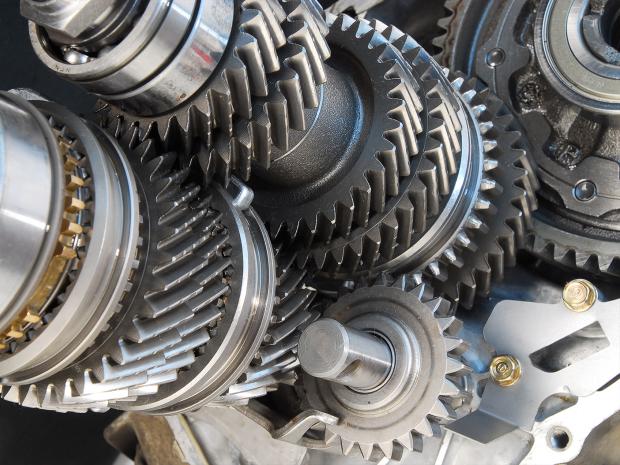- Academics
Mechanical Engineering, B.S.

Mechanical engineering builds the physical systems and devices that define modern society — everything from air conditioning to automobiles, robots to power plants, artificial limbs to escalators, and rocket engines to weather satellites. Mechanical engineering offers almost limitless opportunity for the inventions and innovations that lead to entrepreneurial ventures.
Through hands-on computer and laboratory work in our state-of-the-art facilities, the School of Engineering's Bachelor of Science in Mechanical Engineering (BMSE) program teaches the principles underpinning the discipline and how to apply them in the field. We also develop your talents in such specialized areas as solid and fluid mechanics, machine control systems, and robotic devices.Our BSME degree program is accredited by the Engineering Accreditation Commission of ABET.
Mechanical engineers find careers in industries including national defense, aerospace, automotive, and telecommunications. Mechanical engineering also has a long tradition of breaking new ground in such areas as resource conservation, improved efficiency of energy-consuming devices, and renewable energy sources. There are emerging opportunities in biomedical systems and devices, as well as nanotechnology and mechatronics. Alternatively, our students can use their education as a springboard to law, medicine, corporate management, or further graduate studies.
About the Program
Program Educational Objectives
The objectives of the undergraduate Bachelor of Science in Mechanical Engineering (BSME) program at the Tandon School of Engineering of New York University are for its graduates to:
1. Be engaged and advance in careers in mechanical or related engineering, or other professional career paths, that include industry, academia, and governmental or non-governmental organizations.
2. Seek continuous professional development and life-long learning through graduate school studies, continuing education credits and/or professional registration.
Student Outcomes
The student outcomes are as follows:
- an ability to identify, formulate, and solve complex engineering problems by applying principles of engineering, science, and mathematics
- an ability to apply engineering design to produce solutions that meet specified needs with consideration of public health, safety, and welfare, as well as global, cultural, social, environmental, and economic factors
- an ability to communicate effectively with a range of audiences
- an ability to recognize ethical and professional responsibilities in engineering situations and make informed judgments, which must consider the impact of engineering solutions in global, economic, environmental, and societal contexts
- an ability to function effectively on a team whose members together provide leadership, create a collaborative and inclusive environment, establish goals, plan tasks, and meet objectives
- an ability to develop and conduct appropriate experimentation, analyze and interpret data, and use engineering judgment to draw conclusions
- an ability to acquire and apply new knowledge as needed, using appropriate learning strategies
- (P1) apply principles of engineering, basic science, and mathematics (including multivariate calculus and differential equations) to model, analyze, design, and realize physical systems, components or processes
Minors
You can choose to enhance your undergraduate degree with a minor that can be seamlessly integrated into your BS in Mechanical Engineering program:
Minor in Aerospace Engineering
Moon and planetary vehicles, deep-space probes and space habitats, once confined to the realm of science fiction, are now realities. Vehicles under design or projected for the future in aircraft, spacecraft, and other airborne and space-related devices and systems challenge the imagination. They also challenge the current knowledge base and state of the art of the technologies involved. The scientific aspects of aircraft and spacecraft design are rooted in mechanical engineering. The Minor in Aerospace Engineering prepares students to push the boundaries of knowledge, lead teams of specialists to achieve mission-specific goals, and follow successful careers in aerospace related industries.
Minor in Robotics
Robotics has a central role to play in future urban environments and the improvement of human life, from mobility to healthcare, from infrastructure management to the service industry. Robotics education at NYU focuses on developing and teaching the fundamental principles, theories, and algorithms for autonomous intelligent machines. Through our educational programs, we aim to prepare students who can contribute to enhancing mobility, service, infrastructure, and healthcare. Our mission is to educate and mentor students in the theory and practice of robotics such that they can make a positive impact on society.
The Department of Mechanical & Aerospace Engineering also offers a minor in mechanical engineering for students in other majors. Please consult with your major academic advisor to understand how these courses may apply to the electives in your degree.
Curriculum
To receive a Bachelor of Science in Mechanical Engineering at the Tandon School of Engineering, you must complete 131 credits, which are broken down into five components:
- Engineering core (47 credits)
- STEM2 electives (6 credits)
- Mathematics, sciences and introduction to engineering (45 credits)
- Humanities and social sciences (24 credits)
- Free electives (9 credits)
Please note that you must earn an average of 2.0 GPA or better after your first four semesters at Tandon, in addition to meeting the Institute requirement of a 2.0 GPA or better for graduation. Seniors with GPAs of 3.5 or better may take certain graduate courses as electives with approval from the departmental adviser.
This program is registered with the New York State Education Department and, as such, satisfies the educational requirements in support of professional engineering licensure and/or certification in New York State, as well as the current educational requirements for licensure and/or certification in essentially all 50 States, the District of Columbia, Puerto Rico, and the U.S. Virgin Islands. While ABET accreditation satisfies the education requirement in essentially every U.S. jurisdiction, each state board still sets its own rules for experience, examination (FE/PE), and any additional requirements (e.g., ethics exam, references). For more information on Professional Licensure, visit the NYU Tandon and/or NYU websites.




